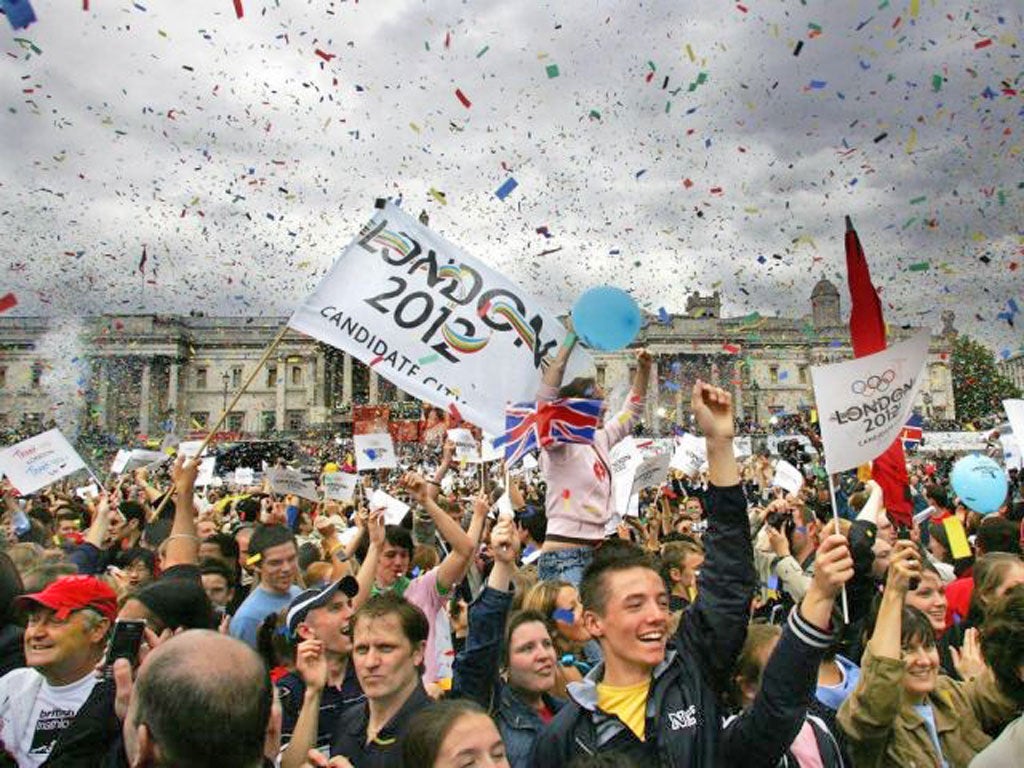If Rio can’t handle the 2016 Olympics, London must offer an encore
Preparations in Rio are in disarray, so why not let London relive the glory of 2012?

Remember the London Olympic Games? Great, weren’t they? Let’s do it all over again, shall we? They’re supposed to be taking place in Rio de Janeiro in 2016 of course, but unless the organisers shift themselves it’s not going to happen.
John Coates, vice-president of the International Olympic Committee, has just paid a visit to see how preparations are going, and came away saying that they’re “the worst I’ve experienced” – even worse, he said, than the Athens Games in 2004.
There have been strikes, delays and funding hold-ups galore. Work hasn’t even started on a military training camp at Deodoro, which – it’s hoped – will eventually house eight venues, including cycling and equestrianism. What’s supposed to be the golf course – the sport is, inexplicably, returning after 112 years – hasn’t even got grass yet.
Rio’s mayor, Eduardo Paes, has admitted to “big issues” in tackling the city’s endemic violence, and recent attempts to clean up the favelas didn’t get very far – except, perhaps, in pushing up extra-judicial shooting figures. Residents have complained that the government is taking the opportunity to get a bit of “social cleansing” done.
There are only two staff in the test department, even though test events are due to start soon. Water pollution could cause problems at the sailing events. Fifa is concerned that the forthcoming football World Cup is going to be a shambles, too.
As Mr Paes said, “Don’t ever in your life do a World Cup and an Olympic Games at the same time. I am not cut out to be a masochist.”
I rather like the organisers’ response to Mr Coates: “The time has now passed when general discussions about the progress of preparations contribute to the journey towards the Games” – the equivalent of putting your fingers in your ears and humming loudly.
An IOC task force is to be flown in to get things back on track, like International Rescue (who did, at least, have a functioning swimming pool, even if Thunderbird machines were wont to pop out at any given moment). There is, said Mr Coates, “no Plan B”.
But there is, if I may make a modest proposal: end this farce now and give the Games to London. The infrastructure’s already there, and though we’d have to start converting a few venues back to their original state we could do that, no problem. We do have form in this respect: we were able to get the 1948 Games up and running in a couple of years, and they went brilliantly.
There are precedents for switching a major sporting event: the 1986 football World Cup was supposed to be held in Colombia. They’d been selected in 1974, giving them 12 years to get it together, but in 1982 they decided they couldn’t afford it, and Mexico was given the gig, managing to carry out the preparations despite a major earthquake eight months before kick-off.
It might be best to draw a veil over our own recent history in this respect: London was chosen to host the 2005 athletics World Championships, but the cost of redeveloping Picketts Lock in north London was deemed too expensive by the government (you’d imagine it might have thought about that beforehand, but no matter). We proposed moving to the Don Valley Stadium in Sheffield, only to be told by the IAAF, athletics’ world governing body, that it was London or nothing. So the Championship ended up in Helsinki.
But that was a lesson learned, one would like to think, and given the resounding success of London 2012, I don’t think we’d have any problems this time round. After the 1948 Games the Observer editor David Astor wrote, “We can feel modest pride that the London Games have been one of the most successful of these festivals of sport … May we not claim to be leading contenders for the honourable title, Enemies of Nonsense?” Let that be our rallying cry as we take over from Rio: “London 2016: Enemies of Nonsense!”
Chinese will just have to get used to Wi-fi
Just as the French agonise over linguistic imports, the Chinese are in a flap about what they’re calling “zero translation” – particularly technical terms, like GDP, Wi-fi and CEO. “How many can people understand these words?” raged the government mouthpiece, the People’s Daily.
The internet is to blame, they say, along with worship of western culture, a paucity of good translators, and sheer laziness. But it’s a quixotic battle they’re fighting. Linguistic wanderlust is inevitable: language is like water: it flows round obstacles, and any attempts to police the Chinese language are doomed.
People here say we’ll have to learn Chinese just to keep up, and a few schools these days offer it at GCSE. That’s all well and good – learning a language is a fine intellectual discipline – but if China really wants to become a global force, particularly in business, they’ll learn English. Everybody else does.

Join our commenting forum
Join thought-provoking conversations, follow other Independent readers and see their replies